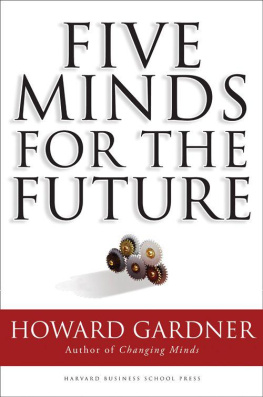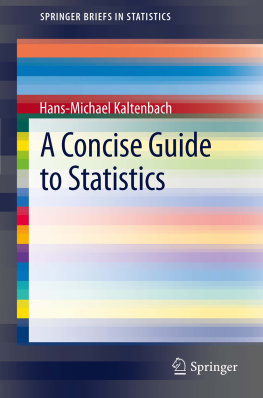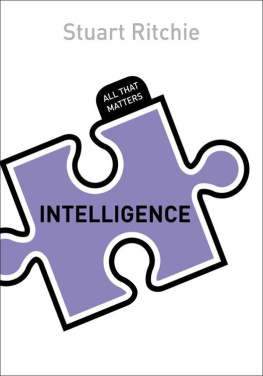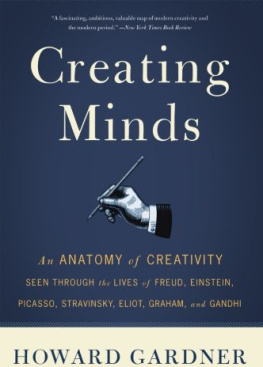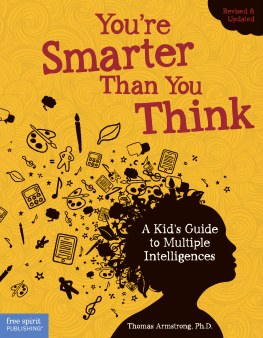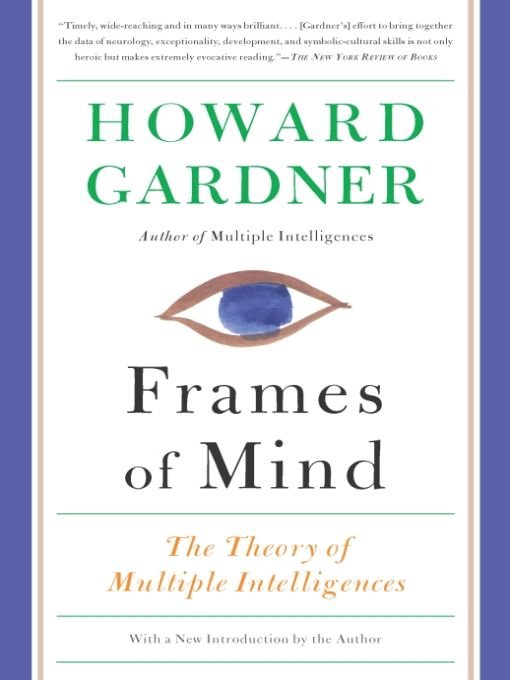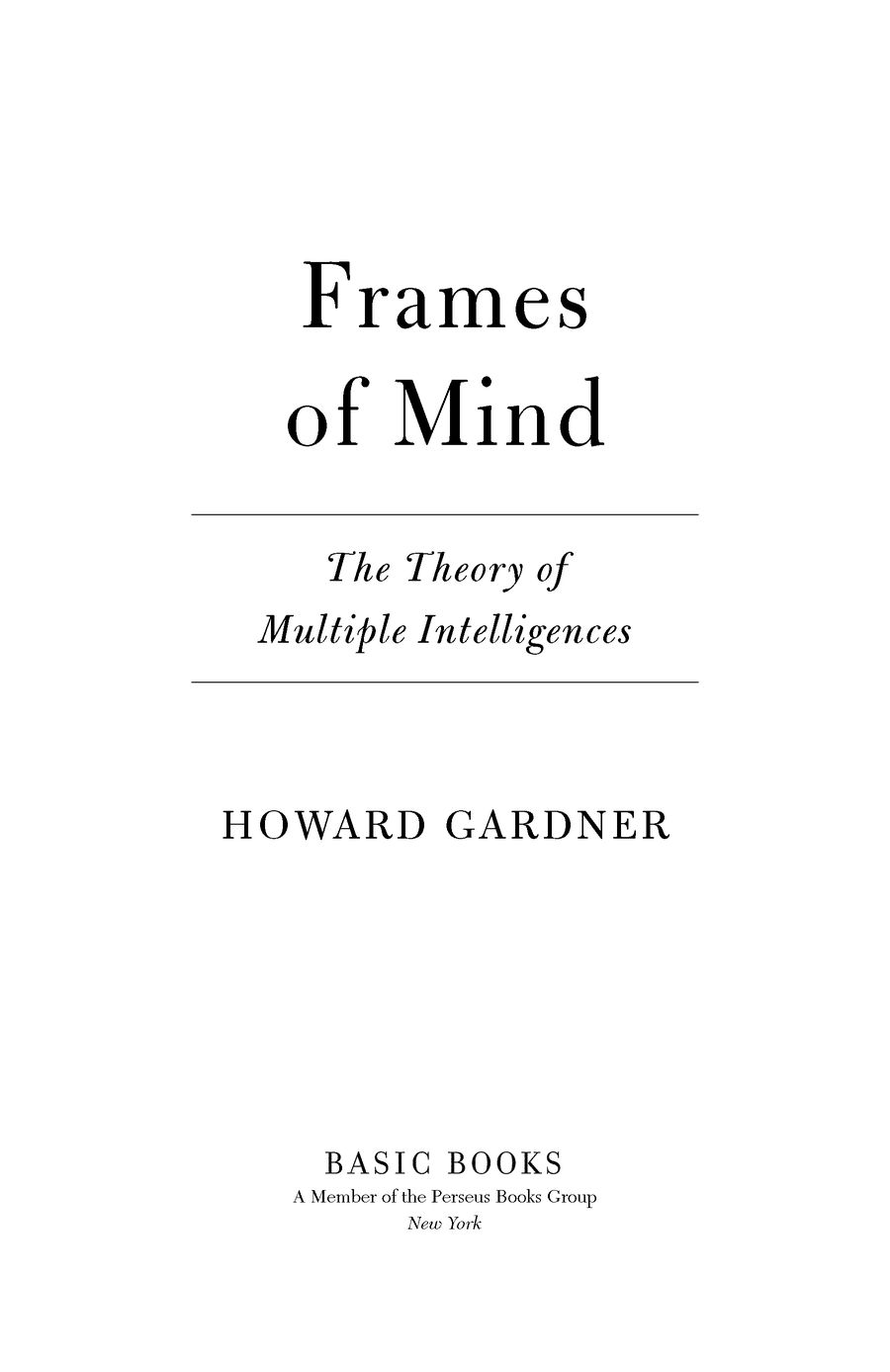Table of Contents
OTHER BOOKS BY HOWARD GARDNER
The Quest for Mind (1973; second edition, 1981)
The Arts and Human Development (1973)
The Shattered Mind (1975)
Developmental Psychology (1978; second edition, 1982)
Artful Scribbles (1980)
Art, Mind, and Brain (1982)
The Minds New Science (1985)
To Open Minds (1989)
The Unschooled Mind (1991, 2011)
Multiple Intelligences (1993)
Creating Minds (1993)
Leading Minds (1995)
Extraordinary Minds (1997)
Intelligence Reframed (1999)
Good Work (2001)
Changing Minds (2004)
Five Minds for the Future (2007)
For Ellen
MULTIPLE INTELLIGENCES
The First Thirty Years
In the years since I published Frames of Mind, I have often been asked how I first got the idea ofor forthe theory of multiple intelligences. Probably the most truthful answer is I dont know. However, such an answer satisfies neither the questioner nor, to be frank, me. With the benefit of hindsight, I would mention several factors, some remote, some directly feeding into my discoveries:
As a young person I was a serious pianist and enthusiastically involved with other arts as well. When I began to study developmental and cognitive psychology in the middle 1960s, I was struck by the virtual absence of any mention of the arts in the key textbooksin the face of numerous discussions of scientific thinking. An early professional goal was to find a place for the arts within academic psychology. I am still trying! In 1967 my continuing interest in the arts prompted me to become a founding member of Project Zero, a basic research group at the Harvard Graduate School of Education begun by a noted philosopher of art, Nelson Goodman. For twenty-eight years (1972-2000), I was the codirector of Project Zero, and I am happy to say that the organization has continued to thrive under new leadership.
As my doctoral studies were drawing to a close, I first encountered the writings of Norman Geschwind, a notable behavioral neurologist. I was fascinated by Geschwinds descriptions of what happens to once-normal or -gifted individuals who have the misfortune of suffering from a stroke, tumor, wound, or some other form of traumatic brain damage. Often the symptoms run counter to intuition: for example, a patient who is alexic but not agraphic loses the ability to read words but can still decipher numbers, name objects, and write normally. Without having planned it that way, I ended up working for twenty years on a neuropsychological unit, trying to understand the organization of human abilities in the brain: how they develop, how they (sometimes) work together, and how they break down under pathological conditions.
This introduction replaces a previous introduction that appeared in earlier editions of this book.
I have always enjoyed writing, and by the time I began my postdoctoral work with Geschwind and his colleagues in 1971, I had already completed three books. My fourth book, The Shattered Mind, published in 1975, chronicled what happens to individuals who suffer from different forms of brain damage. I documented how different parts of the brain are dominant for different cognitive functions. After I completed The Shattered Mind, I thought that I might write a book that describes the psychology of different human facultiesa modern (and hopefully more scientifically grounded) reformulation of phrenology. In 1976 I actually wrote an outline for a book with the tentative title Kinds of Minds. One could say that this book was never writtenand indeed I had totally forgotten about it for many years. But one could also say that it eventually emerged silently from the file cabinet and transmogrified into Frames of Mind.
So much for the more remote causes of the theory.
In 1979, a group of researchers affiliated with the Harvard Graduate School of Education received a sizeable grant from a Dutch foundation, the Bernard van Leer Foundation. This grant was designed for a grandiose purpose, one proposed by the foundation. Members of the Project on Human Potential (as it came to be called) were commissioned to carry out scholarly work on the nature of human potential and how it could best be realized. (Thinking of the United States, Ive sometimes quipped that the Project on Human Potential is more of a West Coast topic than an East Coast topic.) When the projects principal investigators carved out our respective projects, I received an inviting assignment: to write a book chronicling what had been established about human cognition through discoveries in the biological and behavioral sciences. And so was born the research program that ultimately led to the theory of multiple intelligences.
Support from the van Leer Foundation allowed me, with the aid of many valued colleagues, to carry out an extensive research program. I saw this grant as providing a once-in-a-lifetime gift: we had the opportunity to collate and synthesize what I and others had learned about the development of cognitive capacities in normal and gifted children as well as the breakdown of such capacities in individuals who suffered some form of pathology. To put it in terms of my daily calendar, I was seeking to synthesize what I had been learning in the mornings from my study of brain damage with what I was learning in the afternoons from my study of cognitive development. These latter studies actually investigated how young children mastered symbol use in seven different areas ranging from singing to drawing to story-telling. My colleagues and I also combed the literature from brain study, genetics, anthropology, psychology, and other relevant fields in an effort to ascertain the optimal taxonomy of human intellectual capacities.
I can identify a number of crucial turning points in this investigation. I dont remember when it happened but at a certain moment, I decided to call these faculties multiple intelligences rather than assorted abilities or sundry gifts. This seemingly minor lexical substitution proved very important; I am quite confident that if I had written a book called Seven Talents it would not have received the attention that Frames of Mind received. As my colleague David Feldman has pointed out, the selection of the word intelligence propelled me into direct confrontation with the psychological establishment that has long cherished and continues to cherish IQ tests. However, I disagree with Feldmans claim that I was motivated by a desire to slay IQ; neither the documentary nor the mnemonic evidence indicates that I had much interest in such a confrontation.
A second crucial point was the creation of a definition of an intelligence and the identification of a set of criteria that define what is, and what is not, an intelligence. I cant pretend that the criteria were all established a priori; rather, there was a constant fitting and refitting of what I was learning about human abilities with how best to delineate and then apply what ultimately became eight discrete criteria. I feel that the definition and the criteriaas laid out in the opening chapters of this bookare among the most original parts of the work. Interestingly, neither has received much discussion in the literature, on the part of supporters or critics.


